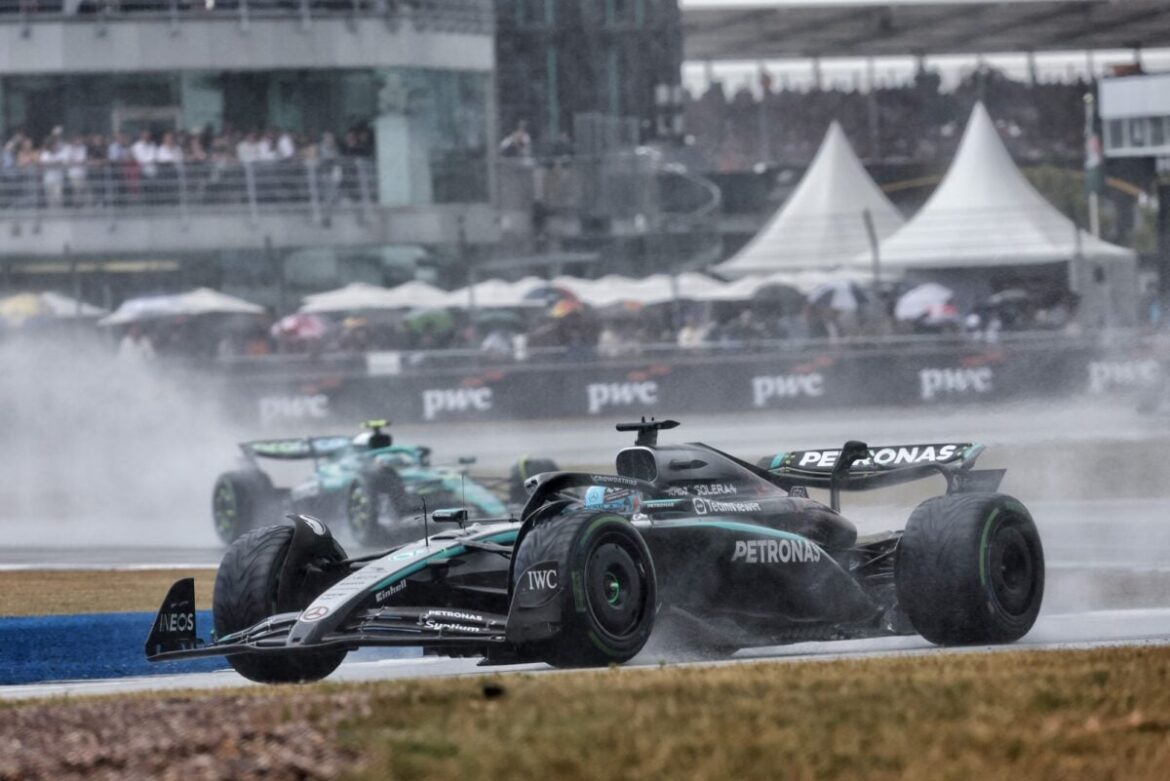Mercedes Faces Challenges at the British Grand Prix: A Story of Strategy and Setbacks
The British Grand Prix proved to be a challenging day for Mercedes, marked by a series of strategic decisions that team principal Toto Wolff described as "terribly wrong" and "catastrophic." George Russell, who started the race from the fourth position, managed to finish only in tenth place, while rookie Kimi Antonelli was forced to retire after a collision with Isack Hadjar from Racing Bulls.
Strategic Decisions Under Scrutiny
Mercedes made the bold choice to start the race on dry tires, a gamble that ultimately did not pay off. This decision cost Russell several positions even before the race officially began. The track conditions were damp, and shortly after the start, rain returned to the Silverstone circuit, complicating matters further for the team.
As the race unfolded, Russell attempted to switch to dry tires again, but it was too early for such a move, leading to him spinning out on the slick surface. "It was a series of errors," Wolff admitted. "The initial decision, whether it was made by the driver or the pit wall, was terribly wrong and put us on a downward spiral."
Kimi Antonelli’s Race Complications
Kimi Antonelli’s experience during the race was equally challenging. The rookie driver was struck from behind by Isack Hadjar in a corner with limited visibility, causing significant damage to his car’s diffuser. "We lost about 40 points of downforce, which is critical," Wolff explained. "There was no way to continue, so we decided to retire the car."
Antonelli primarily attributed his disappointing performance to team mistakes, highlighting the difficulties of being a newcomer in such a competitive environment. Wolff, however, defended Mercedes’ approach: "We made bold choices that worked six or seven times out of ten. The issue today was not the boldness but the completely misguided judgment."
Impact on the Constructors’ Championship
The results from Silverstone had serious implications for the Constructors’ Championship standings. Following the race, Ferrari extended their lead over Mercedes by 12 points. The two teams are locked in a fierce battle for the second position in the standings, having been separated by just one point prior to the British Grand Prix.
This outcome has intensified the competition, and both teams are now more focused than ever on their strategies and performances to gain an edge in the championship race.
Reflections on the Race Weekend
Looking back on the race weekend, Mercedes faced multiple challenges that tested their decision-making abilities. The team’s aggressive strategy of opting for dry tires in wet conditions raised eyebrows among fans and analysts alike. In motorsport, the ability to read the weather and track conditions is crucial, and Mercedes’ miscalculation cost them dearly during the race.
Wolff’s acknowledgment of the mistakes indicates a willingness to face the challenges head-on and learn from them. The pressure is mounting for the team, especially as they continue to seek improvements in their overall performance. With the season moving forward, each race becomes increasingly critical, particularly when competing against a strong rival like Ferrari.
The Importance of Adaptability in Racing
Adaptability is a key component in racing, as conditions can change rapidly. Teams must be prepared to adjust their strategies on the fly. Mercedes’ experience at Silverstone highlights how crucial it is for teams to remain flexible and responsive to on-track developments. In this race, the decision to stick with dry tires was a gamble that ultimately backfired, underscoring the importance of making informed choices based on current conditions.
Looking Ahead to Future Races
As the Formula 1 season progresses, Mercedes will need to reevaluate their strategy and make the necessary adjustments to regain their competitive edge. The lessons learned at Silverstone will undoubtedly influence their approach in upcoming races. The team will likely conduct a thorough analysis of their race strategy and tire choices, ensuring they are better prepared for similar situations in the future.
The fight for points in the Constructors’ Championship is becoming increasingly intense, and every decision counts. With the season still unfolding, there is ample opportunity for Mercedes to bounce back and reclaim their place among the top teams in Formula 1.
Conclusion
In summary, the British Grand Prix was a challenging race for Mercedes, characterized by missteps in strategy and unfortunate circumstances for both drivers. As they navigate the complexities of the season, the team must learn from their experiences and continue to adapt to the ever-changing dynamics of Formula 1 racing. With the pressure mounting and rivals closing in, the stakes have never been higher for Mercedes as they aim to improve their performance in the pursuit of championship success.
